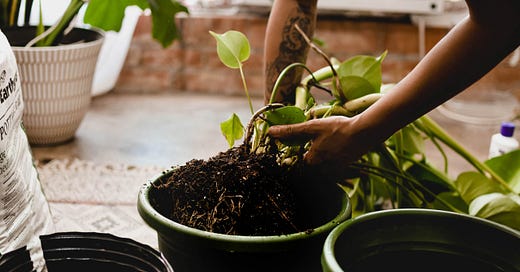In Search of My Grandfather's Garden
After multiple failures, why do I even bother with gardening?
I gave up on gardening this year. It’s a temporary surrender to a schedule that has been too full of travel, swim meets, and concerts to allow engaging in the quotidian labor required to cultivate the three small raised plots in my backyard. It is a reluctant surrender.
At the beginning of the year, I’d prided myself on having signed up for seed catalogs before they ran out. My partner and I spent a few days going through them, creating a spreadsheet of what we planned to plant this year. Every weekend was supposed to be the weekend that we would order them. The next thing we knew, it was late spring and our garden plan was trimmed to a list of ten plants that one company suggested could still be planted for a summer harvest.
At some point, we decided to wait until fall. And then, we stopped talking about it altogether. We stopped gathering coffee grounds, apple cores, and carrot shavings for the compost bin out back. We stopped looking at the weed-filled garden beds. We realized that there’s a reason that the most avid gardeners we have known have been people who were retired or childless or only worked three days per week or had no other hobbies.
The thing is, even when we garden, we’re not good at it. For most of the five or six years that we’ve tried, our efforts have resulted in an almost null harvest: perhaps a handful of green beans or okra (not enough to make a meal), a head of lettuce, sunburned basil and cilantro gone to seed from lack of attention. There was one year that we managed to grow enough tomatoes for the squirrels to leave some for us. Another when the cucumber and pepper harvest allowed for canning. Mostly, though, we are successful with growing weeds. Those we have in abundance.
I don’t have a natural gardening gift. I’ve killed succulents, for crying out loud. This year, I even managed to let my mint plant wither in the blistering Georgia heat. Still, I like to think that gardening is a skill that I can cultivate. Perhaps I need to apprentice myself to my neighbor, who one year decided to add loofahs to his lush garden. Before that, I knew in theory that loofahs were something found in nature, but I would have pointed to the sea as their origin rather than the soil.
When we bought this house eleven years ago, the yard was impeccable, lush green grass bordered by hostas and ornamented by tulips, rose bushes, and hydrangeas. A busted pipe hastened the yard’s path to destruction, but the bigger issue is that we’ve lacked the time, interest, and money to keep up what the family before us had so lovingly cultivated. There’s always something higher on the priority list than the lawn.
For much of my life, my relationship with the land has been heavily colonized and traumatized. I have associated the soil with the systems of slavery and sharecropping that bound my family for most of our existence in this country. Moving to Atlanta in the 1950s freed my family from the toil of struggling against land that was not theirs only to have the harvest taken from them. We didn’t have to get in the dirt to grow our food; we could go to the stores and buy it. We thought that was progress, that it was freedom. We scoffed when my grandfather invited us to help him in the garden. We stood indifferently when he managed to get us to come look at it, trying to figure out just how long we needed to stay out there to seem interested. We didn’t recognize the miracle in the peppers and beans grown from tiny seeds in a backyard belonging to a man who had grown up on a Mississippi farm where his sharecropping parents had barely even belonged to themselves.
I had begun to realize it when we moved into this house. When I had time, I thought, I would bring Grandaddy over to the house and let him teach us what we needed to do to plant a garden. Time, it turned out, was not on our side. Less than a year later, I was diagnosed with breast cancer for the first time. Five days after my diagnosis, my grandfather died. Ever since, I’ve been trying to figure out how to make things grow on my own. I keep failing.
Maybe, though, it’s not the failure that matters, but the attempt. Because every year that we till and weed the soil, planting the seeds and seedlings in their rows, and label the garden stakes, I have some hope that I am recovering what trauma, illness, and death stole from us – the love of the land, the wisdom of my ancestors, the connection to creation.
Let me go look at these seed catalogs and figure out what I can plant this fall.






Beautiful! Gardening is a metaphor for the work we do/ life does on our hearts! Sending you peace!
This is a beautiful essay that touched my gardener's heart deeply. I keep trying, with some success, because the garden is still a miracle. every. single. time.